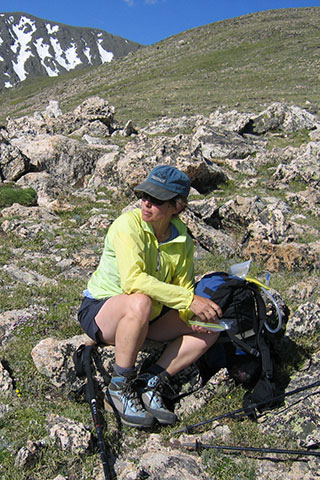| 743 | Self Rescue No Food, No Fuel, No Fun |
2012-12-14 |

One of the keys to avoiding rescues is to keep our bodies fed and producing energy. To make a vehicle's motor go, you have to add fuel. The same is true with our bodies, we need food and water to make our bodies go.
Years ago, I assisted my wife on a few training bicycle rides for Middle School students. The course was a six miles road loop through a hilly park. I was surprised that part of the training was to take breaks - rest, eat, and drink.
What? On a six mile ride - why would you have to stop and eat? That's crazy!
Ah, but the leaders knew what they were doing. The students were preparing for multi-day rides. Training the students before the adventure paid off ten fold. Some students were not good bicycle riders and needed practice. A few of the students were not in good physical condition and needed the additional exercise. And all the students needed to have mini training adventures to help understand the daily routine. The students needed to understand no food, no fuel, no fun! They had to eat and drink to give their bodies fuel to complete their big adventure.
The training rides worked. The students learned - you gotta' eat to keep from bonking.
So for a few tips on staying fueled ...
Our standard routine on the trail is to wake and start walking as soon as possible. We generally eat a small breakfast while getting ready to leave or break camp. With breakfast over, lunch begins. There is rarely a lunch break, instead many small snacks to eat throughout the day.
In the mid '80's the Powerbar became the first sports energy bar. Now an industry has developed to provide food and vitamins to fuel any and every specific need our bodies might have.
The first snack was probably the old standard, GORP ( good old raisins and peanuts). It still works, if you want some low tech energy.
Stores like REI have shelves of energy snack foods to chose from.
My wife has found that the gels work well for her. She doesn't necessarily like the gels, she really eats them like a dose of medicine, taken many times each day.
Always drink water with the gels or other energy bars.
Pack enough snacks to have one for every two hours of hiking.
We keep a gel in our emergency kits as emergency food. Last summer I finally ate it after carrying it in my pack untouched since 2009. It wasn't very good, but I ate it the best I could.
Keep food and water readily accessible, so you can eat and drink while moving.
Many packs have small pockets on their waist belts which are convenient to store snacks.
I hardly ever use a waist belt, but keep snacks in my pockets.
Find snacks you like to eat. Experiment at home or on short hikes. If you don't like the snack while riding home from the store, you won't like it any better on the trail.
If I don't like a snack, I won't eat it, unless I am absolutely desperate.
Choose your snacks wisely. Be informed on your body's needs. Eat a balanced diet even on the trail.
My favorite snack is a peanut butter - Powerbar. I keep it in my front pants pocket and tear off little chunks for a mini snack to last through the day. Many manufacturers also make small individual bites of energy bars, but tearing off a small piece from a whole bar is easy enough and cheaper.
Don't bonk and have to call for a rescue or make bad decisions brought on by the lack of food or water - pack enough food for the day and snack (and drink) at regular intervals to keep your motor running smoothly.
Happy fueled trails
Down is Optional ... Up is Mandatory - introduction
Self Rescue on Trails - the program
Self Rescue - Plan Ahead - plan to prevent
Self Rescue - Be Kind to Yourself - don't make it hard, make it easy
Self Rescue - Be a Lightweight - walk light and easy
Self Rescue - Avoid Huffing and Puffing - listen to your body and control your speed
Self Rescue - Take a Break - give your body a chance to recover
Self Rescue - No Food, No Fuel, No Fun - feed the motor
Self Rescue - Watch Your Time - always know your location, time, and speed